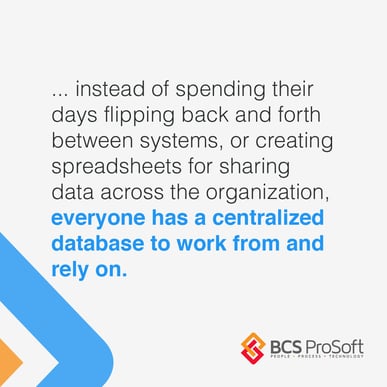By merging disparate IT solutions onto a unified cloud platform, teams can break free of siloed applications and get the visibility and control they need to better run profitable, successful businesses.
Determined to keep doing things the way they’ve always been done, many businesses are buckling under the pressure of disparate systems, on-premises legacy solutions, spreadsheets, and other manual-intensive business management approaches. This was already happening pre-COVID, with the global pandemic, the move to remote work, and rampant supply chain shortages all shining a bright hot light on the danger of relying heavily on siloed, disparate technology systems.
5 Reasons to Unify Your Systems Now
Unintegrated software systems put unnecessary pressures on businesses and force their leadership to leave too much to chance. Without accurate data and reliable financial dashboards, they can’t make good decisions, review historical performance, or understand metrics like profitability across their organizations. Here are five reasons teams are connecting their companies’ disparate systems and adopting unified enterprise resource planning (ERP) platforms like NetSuite:
 1) To improve financial accuracy and insight.
1) To improve financial accuracy and insight.
Balance sheets, income statements, and cash flow statements are essential financial tools for any business, but they don’t tell the whole story. For example, they don’t show why labor costs were high last quarter, why profit margins are better in some lines of business than others, or why return rates skyrocketed during the holidays. By working with BCS ProSoft to connect their disparate systems in NetSuite, companies can tap into the power of multidimensional accounting, whereby operationally relevant details (e.g., department, location, product, etc.) are configured as dimensional values. With multidimensional accounting, companies reconcile bank and credit card payments; manage employee expenses; consolidate to a master profit & loss (P&L) statement; and make allocations based on entity. This helps create more accurate audit trails, transactional traceability, security, and controls for all approvals and workflows.
 2) For real-time data and analytics.
2) For real-time data and analytics.
Real-time visibility is impossible to achieve using disparate systems, on-premise solutions, and spreadsheets. To be most useful for stakeholders, the information has to be reliable, accessible, and secure to ensure employees are better informed and can make more accurate, faster decisions. Using NetSuite’s role-based dashboards and reports, BCS ProSoft puts customized, real-time data and analytics into the hands of the employees, managers, and leaders who need it 24/7/365.
 3) To automate repetitive, labor-intensive processes.
3) To automate repetitive, labor-intensive processes.
When companies make certain business processes “automatic,” they can effectively increase efficiency and eliminate up to 40% of repetitive workplace tasks. This reduces hours wasted on redundant tasks by nearly 22 hours per week, and helps improve overall global productivity by 1.4% per year. For these and other reasons, a growing number of organizations are infusing more and more business automation into their operations. By using technology to take the manual labor out of day-to-day business processes, these companies can also simplify and improve the workflow steps that make up the process: When a business process is automated, steps in the existing workflow—email chains, document transfers, and report pulling for example—are eliminated. In an ROI study, Nucleus Research found that customers using NetSuite accelerated their financial close times by up to 50%, increased sales productivity by 12.5%, and increased inventory turns by 50%, among other efficiencies.
 4) Minimize internal and external IT costs.
4) Minimize internal and external IT costs.
By simplifying their IT environments and working with BCS ProSoft to implement NetSuite’s cloud ERP, companies can take a “set it and forget” approach to IT management. This, in turn, frees up IT to focus on optimization and innovation, versus trying to bridge the gaps between their disparate software systems. For instance, the company that trades in its eight different payments systems and 12 custom-built applications for a unified ERP can significantly minimize its own internal IT costs while also lessening its reliance on outside IT resources.
 5) Maximize organizational efficiency and output.
5) Maximize organizational efficiency and output.
When companies bring all of their software onto a single platform, efficiency and output levels both go through the roof. That’s because instead of spending their days flipping back and forth between systems, or creating spreadsheets for sharing data across the organization, everyone has a centralized database to work from and rely on. This empowers employees to customize their processes around their own roles and levels of expertise while also supporting good collaboration and data sharing.
 Don’t Just Leave it Up to Chance
Don’t Just Leave it Up to Chance
As a NetSuite partner, BCS ProSoft helps companies leverage real-time business analytics and flexible processes; monitor and respond to change with speed and ease; and unite functions like project/resource management, time and expense management, customer relationship management, and other mission-critical processes onto a single platform.
Once in place, the platform gives companies a comprehensive, real-time picture of their operations. It also supports timely, data-driven decisions across the entire organization, and not just within the silos established by their disparate technology solutions. By merging disparate IT solutions onto a unified cloud platform, teams can break free of siloed applications and get the visibility and control they need to better run profitable, successful businesses.








